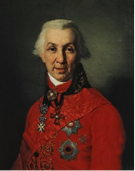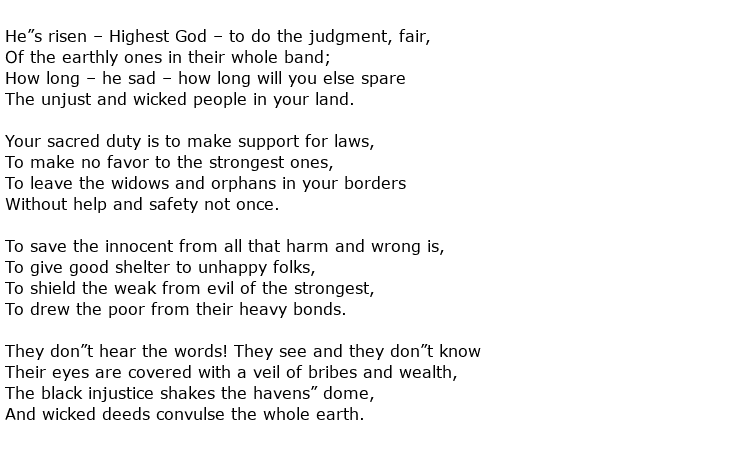 Gavrila Derzhavin was a renowned Russian poet, soldier and civil servant who rose to prominence during the reign of Catherine the Great. His work has been compared with that of the great Alexander Pushkin. While some of his poetry was of a classical nature, other elements had metaphysical qualities reminiscent of the Englishman John Donne. Other elements of his work were heavily politicised.
Gavrila Derzhavin was a renowned Russian poet, soldier and civil servant who rose to prominence during the reign of Catherine the Great. His work has been compared with that of the great Alexander Pushkin. While some of his poetry was of a classical nature, other elements had metaphysical qualities reminiscent of the Englishman John Donne. Other elements of his work were heavily politicised.
He was born Gavrila Romanovich Derzhavin on the 14th July 1743 in Kazan, a large city in European Russia. An ancestor of his was a Tatar and displaced member of the 15th century Great Horde who had become a wealthy landowner, courtesy of the Russian Grand Prince Vasily II. However, by the time Gavrila was born, the lands were long gone and family circumstances were very modest. He received some education at the local gymnasium and then, when old enough, he enlisted into the army, serving first as a private guardsman in St Petersburg.
Having given distinctive military service his considerable abilities saw a meteoric rise once he had joined the civil service. During the 1780s he held governorships in two locations and then a number of high-ranking government posts, culminating in an appointment as Minister of Justice in 1802. This lasted for only one year though and he then retired to a country estate near Novgorod where he spent the rest of his life writing. He also retained a house in St Petersburg where he held regular literary meetings of a society known as the Lovers of the Russian Word.
Derzhavin was much in favour at the court of the Empress Catherine and he dedicated much of his poetry, often in the form of odes, to her and other influential courtiers. Many of these were somewhat surreal in quality and content, heavy on satire and his own brand of humour. In one ode, for example, he compares his poetry to lemonade while describing a search through his wife’s hair for fleas.
On the other hand he was never afraid to criticise those who ruled the lands or sat in judgement of the ordinary people. An example was his poem To Rulers And Judges and here are the opening verses of that piece:

In his public service role, at the beginning of the 19th century, Derzhavin was commissioned to write a report for Emperor Paul I on the famine being suffered by the people of Belorussia. Whether or not he was genuinely anti-Jew, the author turned it into a fiercely critical review of Jewish traders’ and landowners’ exploitation of the people and he recommended that sweeping reforms be implemented. These included forcibly resettling Russian Jews in new colonies adjacent to the Black Sea. This report, titled Opinion, was taken seriously and used in the implementation of new laws ordered by the new emperor, Alexander I, in the 1804 Statute Concerning the Organization of the Jews.
As a poet, Derzhavin was highly respected and his major works were his odes, good examples being On the Death of Prince Meschersky, written in 1779 and the much-translated God, written six years later. His words were even incorporated into the first Russian national anthem, Let the thunder of victory sound! This was superseded by God Save the Tsar! in 1833.
Gavrila Derzhavin died on the 20th July 1816 at the age of 73. His body was buried in the Khutyn Monastery near Zvanka but was exhumed by the Soviets and reburied in the Novgorod Kremlin. As the winds of political change swept through Russia the remains were eventually returned to Khutyn.

